Answered step by step
Verified Expert Solution
Question
1 Approved Answer
Questions Digital transformation of firms in separate industries has been one of the core elements in several nations development and public policy plans. Discuss the
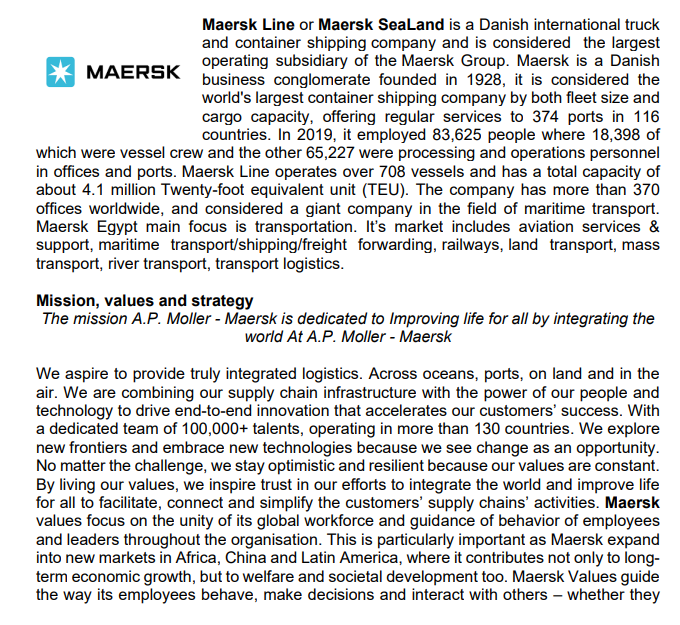
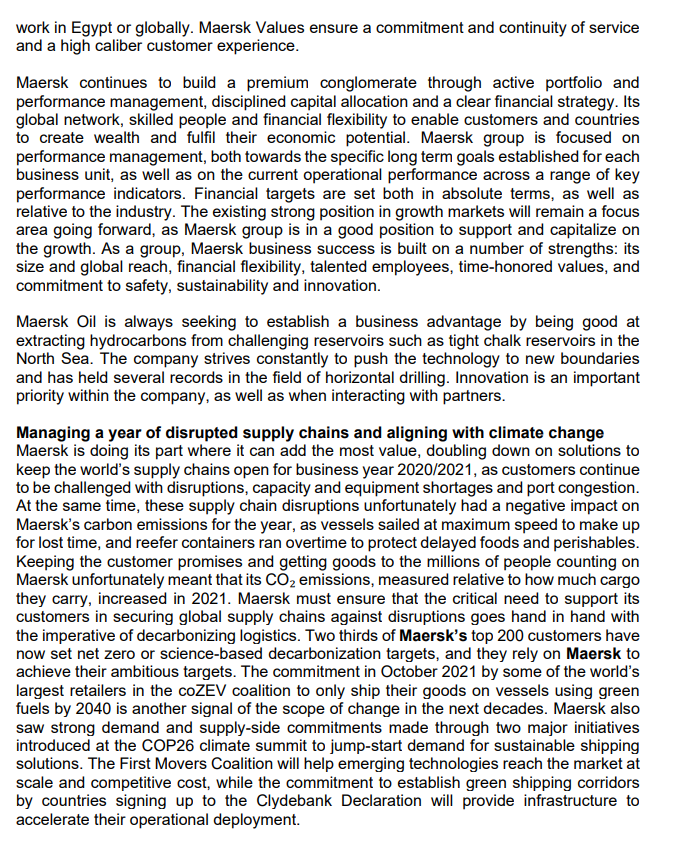
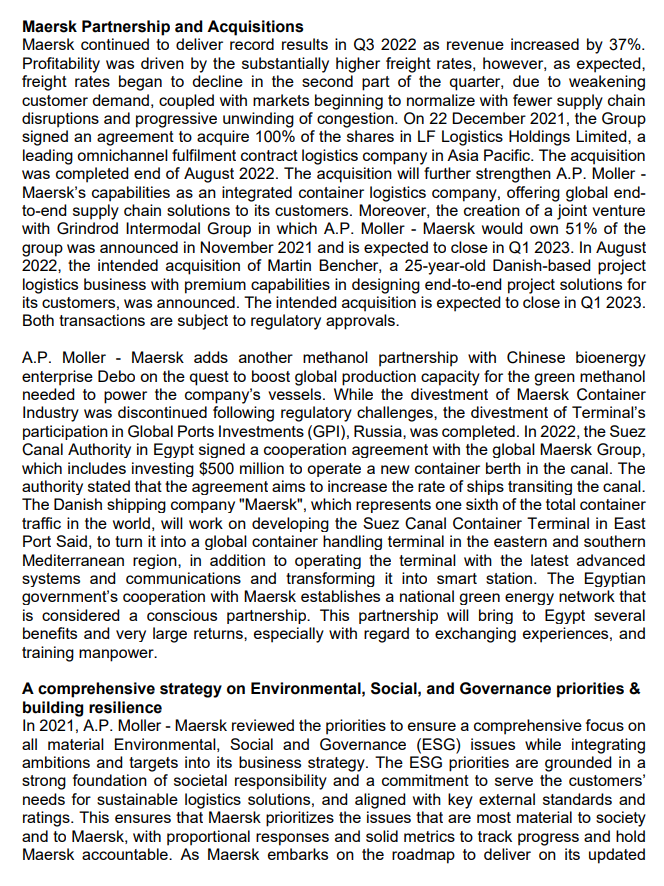
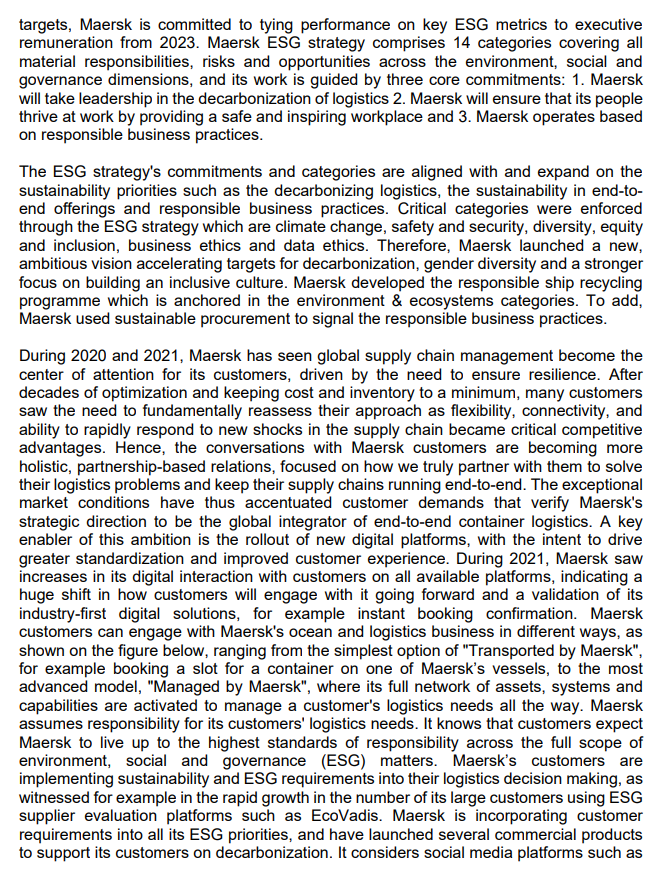
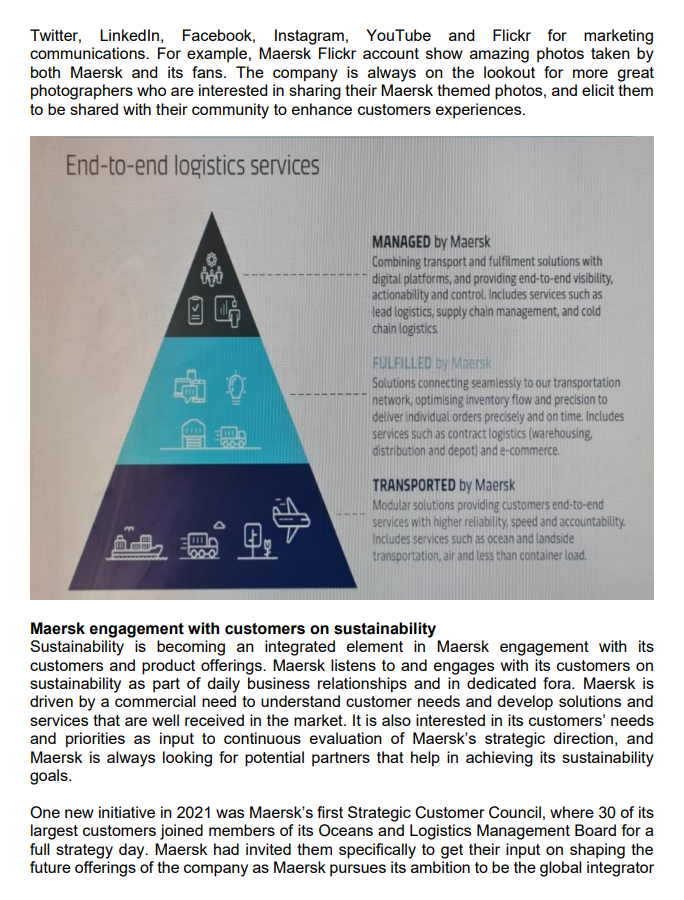
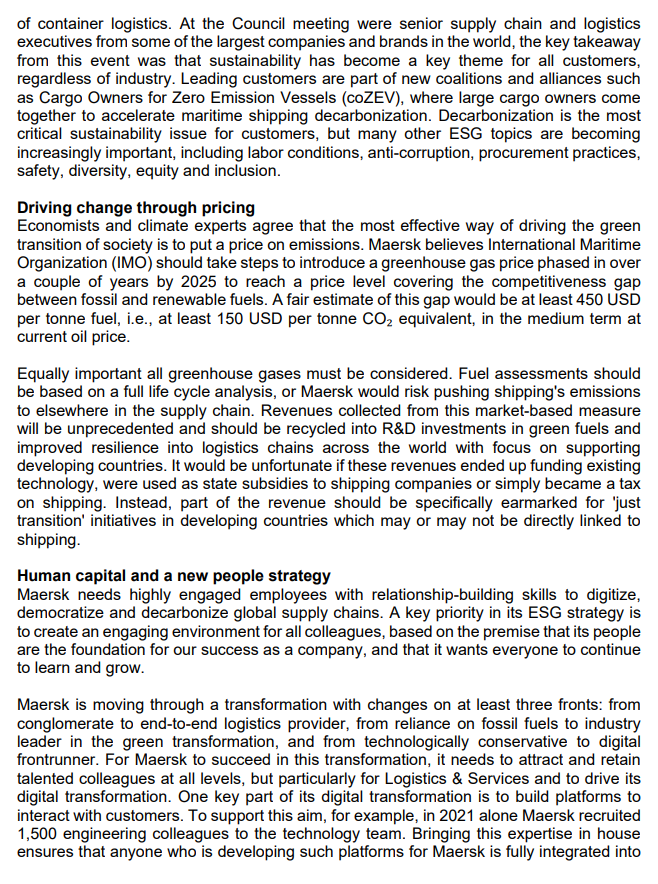
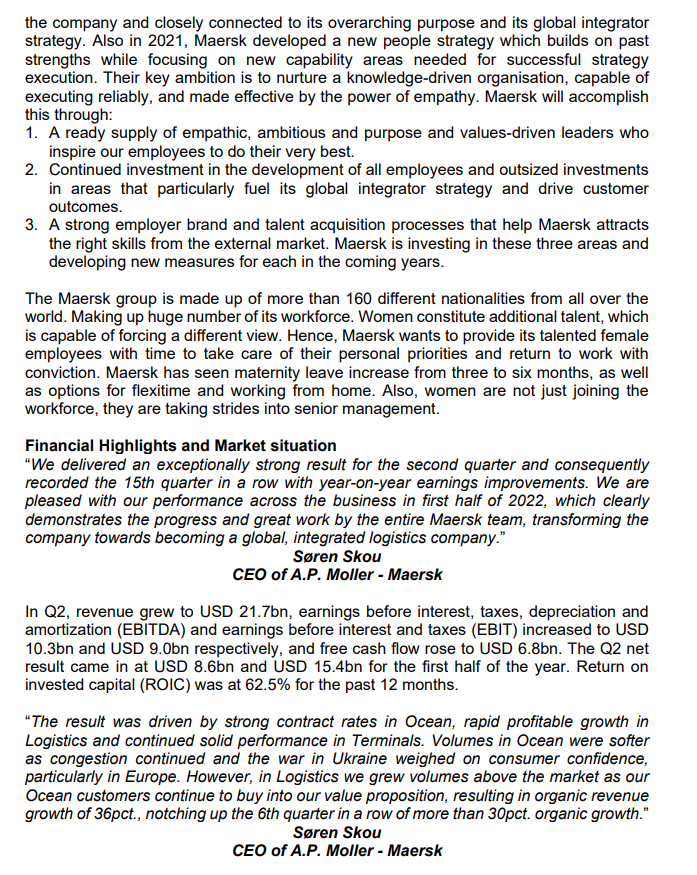
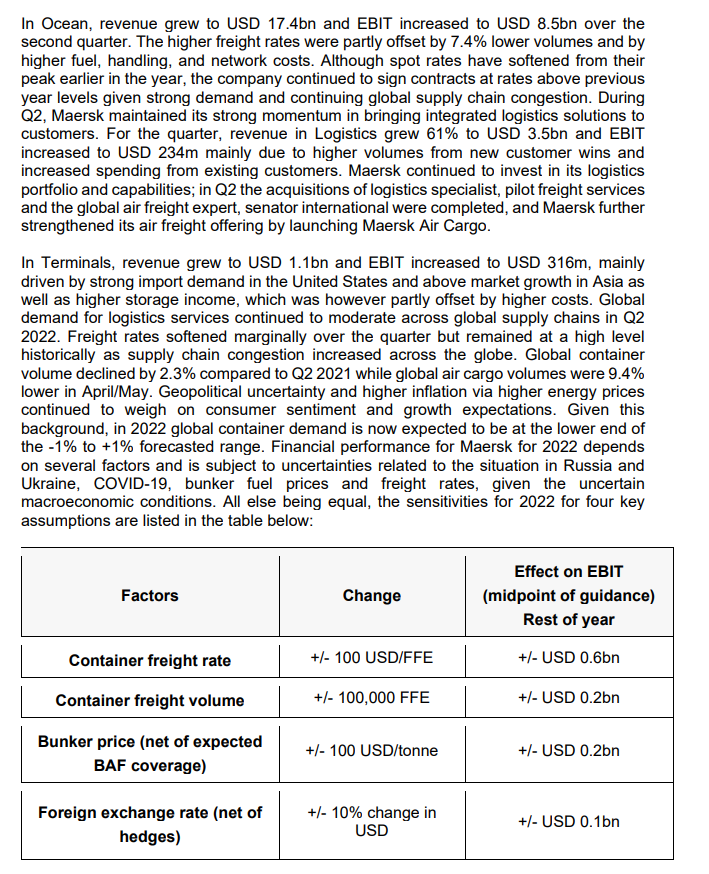
Questions
Digital transformation of firms in separate industries has been one of the core elements in several nations development and public policy plans. Discuss the aspects which Maersk used to digitally transform and implement their environmental, social and governance framework.
Maersk Line or Maersk SeaLand is a Danish international truck and container shipping company and is considered the largest MAERSK operating subsidiary of the Maersk Group. Maersk is a Danish business conglomerate founded in 1928, it is considered the world's largest container shipping company by both fleet size and cargo capacity, offering regular services to 374 ports in 116 countries. In 2019, it employed 83,625 people where 18,398 of which were vessel crew and the other 65,227 were processing and operations personnel in offices and ports. Maersk Line operates over 708 vessels and has a total capacity of about 4.1 million Twenty-foot equivalent unit (TEU). The company has more than 370 offices worldwide, and considered a giant company in the field of maritime transport. Maersk Egypt main focus is transportation. It's market includes aviation services \& support, maritime transport/shipping/freight forwarding, railways, land transport, mass transport, river transport, transport logistics. Mission, values and strategy The mission A.P. Moller - Maersk is dedicated to Improving life for all by integrating the world At A.P. Moller - Maersk We aspire to provide truly integrated logistics. Across oceans, ports, on land and in the air. We are combining our supply chain infrastructure with the power of our people and technology to drive end-to-end innovation that accelerates our customers' success. With a dedicated team of 100,000+ talents, operating in more than 130 countries. We explore new frontiers and embrace new technologies because we see change as an opportunity. No matter the challenge, we stay optimistic and resilient because our values are constant. By living our values, we inspire trust in our efforts to integrate the world and improve life for all to facilitate, connect and simplify the customers' supply chains' activities. Maersk values focus on the unity of its global workforce and guidance of behavior of employees and leaders throughout the organisation. This is particularly important as Maersk expand into new markets in Africa, China and Latin America, where it contributes not only to longterm economic growth, but to welfare and societal development too. Maersk Values guide the way its employees behave, make decisions and interact with others - whether they work in Egypt or globally. Maersk Values ensure a commitment and continuity of service and a high caliber customer experience. Maersk continues to build a premium conglomerate through active portfolio and performance management, disciplined capital allocation and a clear financial strategy. Its global network, skilled people and financial flexibility to enable customers and countries to create wealth and fulfil their economic potential. Maersk group is focused on performance management, both towards the specific long term goals established for each business unit, as well as on the current operational performance across a range of key performance indicators. Financial targets are set both in absolute terms, as well as relative to the industry. The existing strong position in growth markets will remain a focus area going forward, as Maersk group is in a good position to support and capitalize on the growth. As a group, Maersk business success is built on a number of strengths: its size and global reach, financial flexibility, talented employees, time-honored values, and commitment to safety, sustainability and innovation. Maersk Oil is always seeking to establish a business advantage by being good at extracting hydrocarbons from challenging reservoirs such as tight chalk reservoirs in the North Sea. The company strives constantly to push the technology to new boundaries and has held several records in the field of horizontal drilling. Innovation is an important priority within the company, as well as when interacting with partners. Managing a year of disrupted supply chains and aligning with climate change Maersk is doing its part where it can add the most value, doubling down on solutions to keep the world's supply chains open for business year 2020/2021, as customers continue to be challenged with disruptions, capacity and equipment shortages and port congestion. At the same time, these supply chain disruptions unfortunately had a negative impact on Maersk's carbon emissions for the year, as vessels sailed at maximum speed to make up for lost time, and reefer containers ran overtime to protect delayed foods and perishables. Keeping the customer promises and getting goods to the millions of people counting on Maersk unfortunately meant that its CO2 emissions, measured relative to how much cargo they carry, increased in 2021. Maersk must ensure that the critical need to support its customers in securing global supply chains against disruptions goes hand in hand with the imperative of decarbonizing logistics. Two thirds of Maersk's top 200 customers have now set net zero or science-based decarbonization targets, and they rely on Maersk to achieve their ambitious targets. The commitment in October 2021 by some of the world's largest retailers in the coZEV coalition to only ship their goods on vessels using green fuels by 2040 is another signal of the scope of change in the next decades. Maersk also saw strong demand and supply-side commitments made through two major initiatives introduced at the COP26 climate summit to jump-start demand for sustainable shipping solutions. The First Movers Coalition will help emerging technologies reach the market at scale and competitive cost, while the commitment to establish green shipping corridors by countries signing up to the Clydebank Declaration will provide infrastructure to accelerate their operational deployment. Maersk Partnership and Acquisitions Maersk continued to deliver record results in Q3 2022 as revenue increased by 37%. Profitability was driven by the substantially higher freight rates, however, as expected, freight rates began to decline in the second part of the quarter, due to weakening customer demand, coupled with markets beginning to normalize with fewer supply chain disruptions and progressive unwinding of congestion. On 22 December 2021, the Group signed an agreement to acquire 100% of the shares in LF Logistics Holdings Limited, a leading omnichannel fulfilment contract logistics company in Asia Pacific. The acquisition was completed end of August 2022. The acquisition will further strengthen A.P. Moller Maersk's capabilities as an integrated container logistics company, offering global endto-end supply chain solutions to its customers. Moreover, the creation of a joint venture with Grindrod Intermodal Group in which A.P. Moller - Maersk would own 51% of the group was announced in November 2021 and is expected to close in Q1 2023. In August 2022 , the intended acquisition of Martin Bencher, a 25-year-old Danish-based project logistics business with premium capabilities in designing end-to-end project solutions for its customers, was announced. The intended acquisition is expected to close in Q1 2023. Both transactions are subject to regulatory approvals. A.P. Moller - Maersk adds another methanol partnership with Chinese bioenergy enterprise Debo on the quest to boost global production capacity for the green methanol needed to power the company's vessels. While the divestment of Maersk Container Industry was discontinued following regulatory challenges, the divestment of Terminal's participation in Global Ports Investments (GPI), Russia, was completed. In 2022, the Suez Canal Authority in Egypt signed a cooperation agreement with the global Maersk Group, which includes investing $500 million to operate a new container berth in the canal. The authority stated that the agreement aims to increase the rate of ships transiting the canal. The Danish shipping company "Maersk", which represents one sixth of the total container traffic in the world, will work on developing the Suez Canal Container Terminal in East Port Said, to turn it into a global container handling terminal in the eastern and southern Mediterranean region, in addition to operating the terminal with the latest advanced systems and communications and transforming it into smart station. The Egyptian government's cooperation with Maersk establishes a national green energy network that is considered a conscious partnership. This partnership will bring to Egypt several benefits and very large returns, especially with regard to exchanging experiences, and training manpower. A comprehensive strategy on Environmental, Social, and Governance priorities \& building resilience In 2021, A.P. Moller - Maersk reviewed the priorities to ensure a comprehensive focus on all material Environmental, Social and Governance (ESG) issues while integrating ambitions and targets into its business strategy. The ESG priorities are grounded in a strong foundation of societal responsibility and a commitment to serve the customers' needs for sustainable logistics solutions, and aligned with key external standards and ratings. This ensures that Maersk prioritizes the issues that are most material to society and to Maersk, with proportional responses and solid metrics to track progress and hold Maersk accountable. As Maersk embarks on the roadmap to deliver on its updated targets, Maersk is committed to tying performance on key ESG metrics to executive remuneration from 2023. Maersk ESG strategy comprises 14 categories covering all material responsibilities, risks and opportunities across the environment, social and governance dimensions, and its work is guided by three core commitments: 1. Maersk will take leadership in the decarbonization of logistics 2. Maersk will ensure that its people thrive at work by providing a safe and inspiring workplace and 3. Maersk operates based on responsible business practices. The ESG strategy's commitments and categories are aligned with and expand on the sustainability priorities such as the decarbonizing logistics, the sustainability in end-toend offerings and responsible business practices. Critical categories were enforced through the ESG strategy which are climate change, safety and security, diversity, equity and inclusion, business ethics and data ethics. Therefore, Maersk launched a new, ambitious vision accelerating targets for decarbonization, gender diversity and a stronger focus on building an inclusive culture. Maersk developed the responsible ship recycling programme which is anchored in the environment \& ecosystems categories. To add, Maersk used sustainable procurement to signal the responsible business practices. During 2020 and 2021, Maersk has seen global supply chain management become the center of attention for its customers, driven by the need to ensure resilience. After decades of optimization and keeping cost and inventory to a minimum, many customers saw the need to fundamentally reassess their approach as flexibility, connectivity, and ability to rapidly respond to new shocks in the supply chain became critical competitive advantages. Hence, the conversations with Maersk customers are becoming more holistic, partnership-based relations, focused on how we truly partner with them to solve their logistics problems and keep their supply chains running end-to-end. The exceptional market conditions have thus accentuated customer demands that verify Maersk's strategic direction to be the global integrator of end-to-end container logistics. A key enabler of this ambition is the rollout of new digital platforms, with the intent to drive greater standardization and improved customer experience. During 2021, Maersk saw increases in its digital interaction with customers on all available platforms, indicating a huge shift in how customers will engage with it going forward and a validation of its industry-first digital solutions, for example instant booking confirmation. Maersk customers can engage with Maersk's ocean and logistics business in different ways, as shown on the figure below, ranging from the simplest option of "Transported by Maersk", for example booking a slot for a container on one of Maersk's vessels, to the most advanced model, "Managed by Maersk", where its full network of assets, systems and capabilities are activated to manage a customer's logistics needs all the way. Maersk assumes responsibility for its customers' logistics needs. It knows that customers expect Maersk to live up to the highest standards of responsibility across the full scope of environment, social and governance (ESG) matters. Maersk's customers are implementing sustainability and ESG requirements into their logistics decision making, as witnessed for example in the rapid growth in the number of its large customers using ESG supplier evaluation platforms such as EcoVadis. Maersk is incorporating customer requirements into all its ESG priorities, and have launched several commercial products to support its customers on decarbonization. It considers social media platforms such as Twitter, Linkedln, Facebook, Instagram, YouTube and Flickr for marketing communications. For example, Maersk Flickr account show amazing photos taken by both Maersk and its fans. The company is always on the lookout for more great photographers who are interested in sharing their Maersk themed photos, and elicit them to be shared with their community to enhance customers experiences. End-to-end logistics services UANAGED by Maersk :ombining transport and fulfilment solutions with figital platforms, and providing end-to-end visibility, ictionability and control Includes services such as ead logistics, supply chain management, and cold thain logistics. FULFILLED by Maersk folutions connecting seamlessly to our transportation letwork, optimising inventory flow and precision to teliver ind vidual orders precisely and on time. Includes lervices such as contract logistics (warehousing, fistribution and depot) and e-commerce. TRANSPORTED by Maersk Vodular solutions providing customers end-to-end lervices with higher reliability, speed and accountability. hcludes services such as ocean and landside ransportation, air and less than container load. Maersk engagement with customers on sustainability Sustainability is becoming an integrated element in Maersk engagement with its customers and product offerings. Maersk listens to and engages with its customers on sustainability as part of daily business relationships and in dedicated fora. Maersk is driven by a commercial need to understand customer needs and develop solutions and services that are well received in the market. It is also interested in its customers' needs and priorities as input to continuous evaluation of Maersk's strategic direction, and Maersk is always looking for potential partners that help in achieving its sustainability goals. One new initiative in 2021 was Maersk's first Strategic Customer Council, where 30 of its largest customers joined members of its Oceans and Logistics Management Board for a full strategy day. Maersk had invited them specifically to get their input on shaping the future offerings of the company as Maersk pursues its ambition to be the global integrator of container logistics. At the Council meeting were senior supply chain and logistics executives from some of the largest companies and brands in the world, the key takeaway from this event was that sustainability has become a key theme for all customers, regardless of industry. Leading customers are part of new coalitions and alliances such as Cargo Owners for Zero Emission Vessels (coZEV), where large cargo owners come together to accelerate maritime shipping decarbonization. Decarbonization is the most critical sustainability issue for customers, but many other ESG topics are becoming increasingly important, including labor conditions, anti-corruption, procurement practices, safety, diversity, equity and inclusion. Driving change through pricing Economists and climate experts agree that the most effective way of driving the green transition of society is to put a price on emissions. Maersk believes International Maritime Organization (IMO) should take steps to introduce a greenhouse gas price phased in over a couple of years by 2025 to reach a price level covering the competitiveness gap between fossil and renewable fuels. A fair estimate of this gap would be at least 450 USD per tonne fuel, i.e., at least 150 USD per tonne CO2 equivalent, in the medium term at current oil price. Equally important all greenhouse gases must be considered. Fuel assessments should be based on a full life cycle analysis, or Maersk would risk pushing shipping's emissions to elsewhere in the supply chain. Revenues collected from this market-based measure will be unprecedented and should be recycled into R\&D investments in green fuels and improved resilience into logistics chains across the world with focus on supporting developing countries. It would be unfortunate if these revenues ended up funding existing technology, were used as state subsidies to shipping companies or simply became a tax on shipping. Instead, part of the revenue should be specifically earmarked for 'just transition' initiatives in developing countries which may or may not be directly linked to shipping. Human capital and a new people strategy Maersk needs highly engaged employees with relationship-building skills to digitize, democratize and decarbonize global supply chains. A key priority in its ESG strategy is to create an engaging environment for all colleagues, based on the premise that its people are the foundation for our success as a company, and that it wants everyone to continue to learn and grow. Maersk is moving through a transformation with changes on at least three fronts: from conglomerate to end-to-end logistics provider, from reliance on fossil fuels to industry leader in the green transformation, and from technologically conservative to digital frontrunner. For Maersk to succeed in this transformation, it needs to attract and retain talented colleagues at all levels, but particularly for Logistics \& Services and to drive its digital transformation. One key part of its digital transformation is to build platforms to interact with customers. To support this aim, for example, in 2021 alone Maersk recruited 1,500 engineering colleagues to the technology team. Bringing this expertise in house ensures that anyone who is developing such platforms for Maersk is fully integrated into the company and closely connected to its overarching purpose and its global integrator strategy. Also in 2021, Maersk developed a new people strategy which builds on past strengths while focusing on new capability areas needed for successful strategy execution. Their key ambition is to nurture a knowledge-driven organisation, capable of executing reliably, and made effective by the power of empathy. Maersk will accomplish this through: 1. A ready supply of empathic, ambitious and purpose and values-driven leaders who inspire our employees to do their very best. 2. Continued investment in the development of all employees and outsized investments in areas that particularly fuel its global integrator strategy and drive customer outcomes. 3. A strong employer brand and talent acquisition processes that help Maersk attracts the right skills from the external market. Maersk is investing in these three areas and developing new measures for each in the coming years. The Maersk group is made up of more than 160 different nationalities from all over the world. Making up huge number of its workforce. Women constitute additional talent, which is capable of forcing a different view. Hence, Maersk wants to provide its talented female employees with time to take care of their personal priorities and return to work with conviction. Maersk has seen maternity leave increase from three to six months, as well as options for flexitime and working from home. Also, women are not just joining the workforce, they are taking strides into senior management. Financial Highlights and Market situation "We delivered an exceptionally strong result for the second quarter and consequently recorded the 15th quarter in a row with year-on-year earnings improvements. We are pleased with our performance across the business in first half of 2022, which clearly demonstrates the progress and great work by the entire Maersk team, transforming the company towards becoming a global, integrated logistics company." Sren Skou CEO of A.P. Moller - Maersk In Q2, revenue grew to USD 21.7bn, earnings before interest, taxes, depreciation and amortization (EBITDA) and earnings before interest and taxes (EBIT) increased to USD 10.3bn and USD 9.0bn respectively, and free cash flow rose to USD 6.8bn. The Q2 net result came in at USD 8.6bn and USD 15.4bn for the first half of the year. Return on invested capital (ROIC) was at 62.5% for the past 12 months. "The result was driven by strong contract rates in Ocean, rapid profitable growth in Logistics and continued solid performance in Terminals. Volumes in Ocean were softer as congestion continued and the war in Ukraine weighed on consumer confidence, particularly in Europe. However, in Logistics we grew volumes above the market as our Ocean customers continue to buy into our value proposition, resulting in organic revenue growth of 36 pct., notching up the 6th quarter in a row of more than 30 pct. organic growth." Sren Skou CEO of A.P. Moller - Maersk In Ocean, revenue grew to USD 17.4bn and EBIT increased to USD 8.5bn over the second quarter. The higher freight rates were partly offset by 7.4% lower volumes and by higher fuel, handling, and network costs. Although spot rates have softened from their peak earlier in the year, the company continued to sign contracts at rates above previous year levels given strong demand and continuing global supply chain congestion. During Q2, Maersk maintained its strong momentum in bringing integrated logistics solutions to customers. For the quarter, revenue in Logistics grew 61% to USD 3.5bn and EBIT increased to USD 234m mainly due to higher volumes from new customer wins and increased spending from existing customers. Maersk continued to invest in its logistics portfolio and capabilities; in Q2 the acquisitions of logistics specialist, pilot freight services and the global air freight expert, senator international were completed, and Maersk further strengthened its air freight offering by launching Maersk Air Cargo. In Terminals, revenue grew to USD 1.1bn and EBIT increased to USD 316m, mainly driven by strong import demand in the United States and above market growth in Asia as well as higher storage income, which was however partly offset by higher costs. Global demand for logistics services continued to moderate across global supply chains in Q2 2022. Freight rates softened marginally over the quarter but remained at a high level historically as supply chain congestion increased across the globe. Global container volume declined by 2.3% compared to Q2 2021 while global air cargo volumes were 9.4% lower in April/May. Geopolitical uncertainty and higher inflation via higher energy prices continued to weigh on consumer sentiment and growth expectations. Given this background, in 2022 global container demand is now expected to be at the lower end of the 1% to +1% forecasted range. Financial performance for Maersk for 2022 depends on several factors and is subject to uncertainties related to the situation in Russia and Ukraine, COVID-19, bunker fuel prices and freight rates, given the uncertain macroeconomic conditions. All else being equal, the sensitivities for 2022 for four keyStep by Step Solution
There are 3 Steps involved in it
Step: 1

Get Instant Access to Expert-Tailored Solutions
See step-by-step solutions with expert insights and AI powered tools for academic success
Step: 2

Step: 3

Ace Your Homework with AI
Get the answers you need in no time with our AI-driven, step-by-step assistance
Get Started


